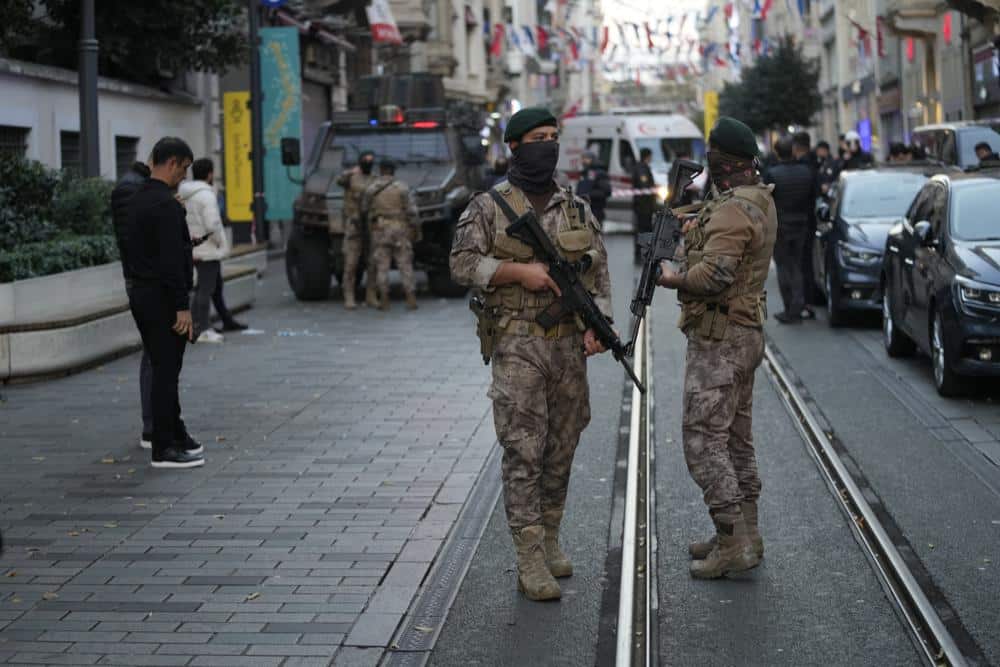Turkish air strikes conducted in northern Iraq on Sunday night, as stated by Turkey’s defense ministry, resulted in the “neutralization” of numerous Kurdish militants and the destruction of their depots and shelters. This operation came shortly after a Kurdish group claimed responsibility for a bomb attack in the capital city of Ankara.
On Sunday morning, two assailants detonated a bomb near government buildings in Ankara, resulting in the death of both attackers and the injury of two police officers. The banned Kurdistan Workers Party (PKK) militant group claimed responsibility for this attack.
The ministry reported, “A total of 20 targets were destroyed, consisting of caves, bunkers, shelters, and depots used by the separatist terrorist organization.” The term “neutralized” was used to indicate that many militants were killed in these operations. These airstrikes were carried out in the Metina, Hakurk, Qandil, and Gara regions of northern Iraq at 9 p.m. (1800 GMT), and the ministry emphasized that all necessary precautions were taken to prevent harm to civilians and the environment.
Earlier on Sunday, CCTV footage showed a vehicle pulling up to the main gate of the Interior Ministry, with one of its occupants quickly approaching the building before being engulfed in an explosion. The other individual remained on the street. One attacker was killed in the blast, while authorities eliminated the other. This explosion sent shockwaves through a district housing ministerial buildings and the nearby parliament, marking the first attack in the capital in several years and coinciding with the opening of the new parliamentary session.
The ANF News website, closely associated with the PKK, cited the group as claiming responsibility for the attack, carried out by a team from its Immortals Battalion unit. The PKK has been classified as a terrorist organization by Turkey, the United States, and the European Union. It initiated an insurgency in south-eastern Turkey in 1984, resulting in the deaths of over 40,000 people in the ongoing conflict.
The bomb explosion on Ataturk Boulevard was the first such incident in Ankara since 2016 when a series of deadly attacks plagued the country.
Subsequent videos depicted a Renault cargo vehicle parked at the scene, with shattered windows and open doors, amidst debris and surrounded by soldiers, ambulances, fire trucks, and armored vehicles.
A senior Turkish official informed a western news agency that the attackers had hijacked the vehicle and killed its driver in Kayseri, a city located 260 kilometres (161 miles) southeast of Ankara, before executing the attack.
During a series of violent incidents in 2015 and 2016, Kurdish militants, ISIS, and other groups either claimed responsibility for or were implicated in a series of attacks in Turkish cities.
Furthermore, the rise of ISIS in Syria and Iraq in the mid-2010s had significant repercussions for Turkey. The porous border between Turkey and its troubled neighbours facilitated the flow of foreign fighters and logistical support to ISIS, leading to a spate of deadly attacks within Turkey, including bombings in Istanbul and Ankara.
Turkey’s fight against terrorism has been multifaceted, involving both domestic and international efforts. The country has undertaken military operations, intelligence sharing, and law enforcement initiatives to combat various extremist groups. Additionally, Turkey has called for greater international cooperation in addressing the root causes of terrorism, including socioeconomic factors and ideological extremism.
Throughout its history, Turkey has demonstrated resilience in the face of terrorism, and its security forces have worked tirelessly to protect its citizens and maintain stability. However, the threat of terrorism remains a persistent challenge that requires ongoing vigilance and cooperation with the international community and especially regional allies.
Image Credit: AP Photo/Francisco Seco



















